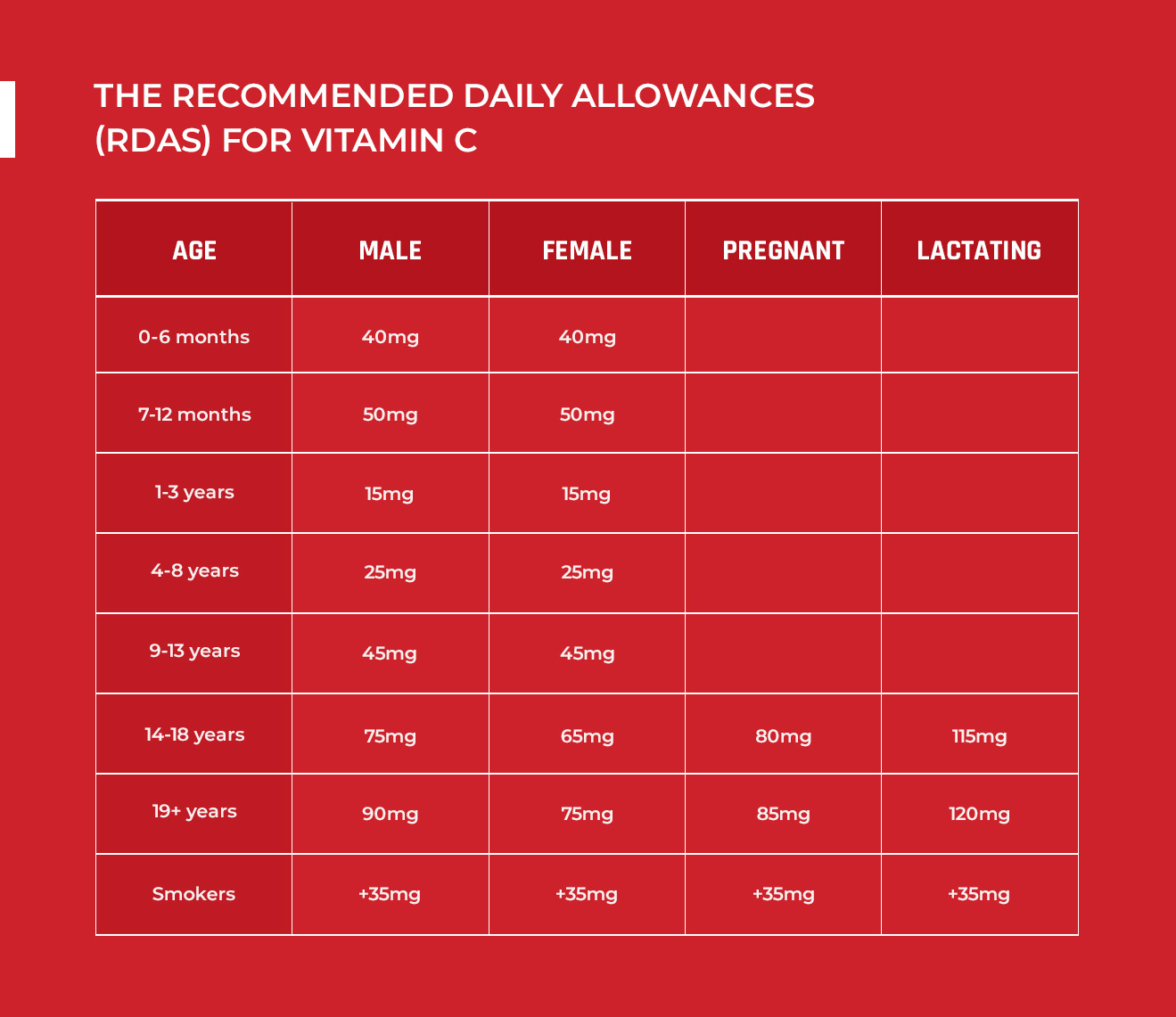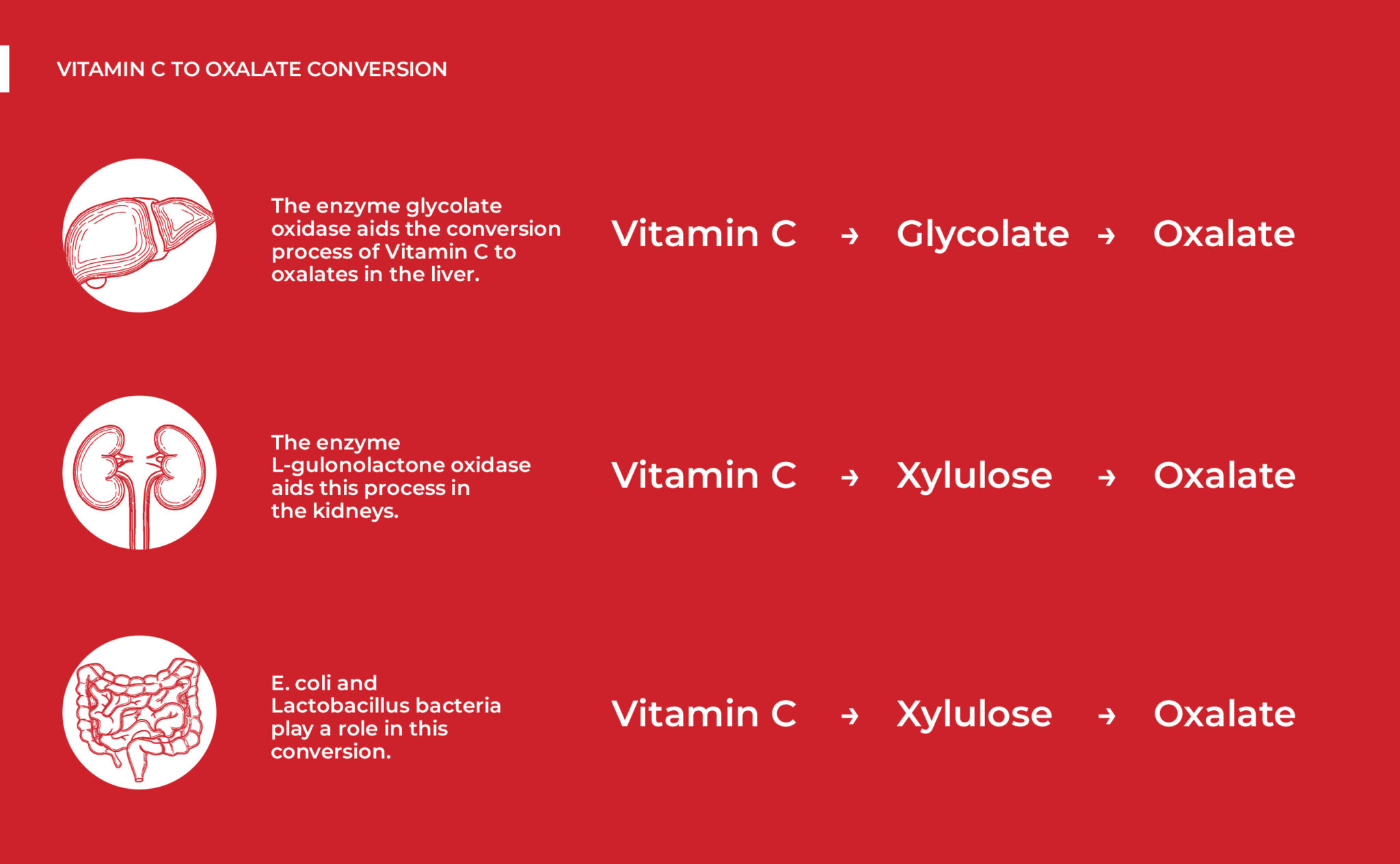Published: February 25, 2024 | 7 mins read
The Truth about Vitamin C and Kidney Stone Risk
When winter is around the corner, you also know that flu season may soon come knocking on your door. Most people who don’t like the feeling of being under the weather will surely stock Vitamin C right away, be it from natural sources or supplements.
Usually, vitamin C supplement doses range from 250 mg to 1,000 mg. If you include the natural dose you get from the foods you eat, that means total consumption exceeds the recommended daily intake up to 15 times!
Excess vitamin C is a scary problem―it increases your risk of kidney stones.
Before diving into this kidney stone connection, let’s first talk about how much vitamin C you need.
HOW MUCH VITAMIN C DO YOU NEED?
According to the US Food and Nutrition Board (FNB), most adults need no more than 90 mg of vitamin C daily, except for those who are pregnant, lactating, or smoking.
But what about fighting the flu, right?
Many supplement brands have led us to believe that consuming more vitamin C would help us fight against the flu. However, there’s no scientific evidence that vitamin C directly prevents cold and flu viruses. It helps your immune system, but not directly in preventing flu.
For general reference, here are the recommended daily allowances (RDAs) for vitamin C.

You can bet that going over these numbers is not a good idea, especially if your intake reaches 2,000 mg.
For those of you out there who’ve listened to the dietary advice we’ve been dolling out over the last few years, you may be wondering what you need in terms of Vitamin C. As it turns out, people on a carnivore diet need less vitamin C than those who are on a carb-rich diet.This is because vitamin C and glucose (simple sugar) compete for absorption. That means cutting carbs and processed sugar promotes higher absorption of this vitamin. In fact, as little as 10 mg of vitamin C a day is enough to avoid scurvy (severe vitamin C deficiency).
To prove whether these claims on the carnivore diet were true, an experiment was conducted in 1928. An arctic explorer, Vilhjalmur Stefansson, and a member of his crew, Karsten Anderson, were participants in this experiment. The two men were given only meat as food for an entire year. By the end of the experiment, no scurvy or other health problems were found. The result of the study was published in the Journal of Biological Chemistry in February 1930, entitled “Prolonged meat diets with a study of kidney function and ketosis.”
Stefansson learned of the carnivore diet during the time he spent with Eskimos in 1906. When the ship carrying their supplies didn’t arrive, he depended on the hospitality of a local family to support his needs. The family was only eating fish, so, he had no other choice but to conform to their diet. Later, he learned to love this diet as he began to see its true health benefits. This is what he wrote for the Harper’s Monthly Magazine in 1935 regarding the experience:
“I did not get scurvy on the fish diet nor learn that any of my fish-eating friends ever had it … There were certainly no signs of hardening of the arteries and high blood pressure, of the breakdown of the kidneys, or of rheumatism”.
These facts show that you don’t need to go crazy with vitamin C. If you overdose on this vitamin, some of the things you might experience are the following:
- Feelings of weakness
- Dizziness
- Abdominal pain
- Heartburn
- Cramps
- Diarrhea
- Headaches
- Nausea (and possible vomiting)
- Sleeping problems
- Allergic reactions to skin
In children, vitamin C overdose can cause increased nervousness or restlessness. It can also cause skin rashes. Among pregnant women, however, it can cause severe disorders in the fetus’ metabolism.
Here’s the worst news! If your vitamin C overdose, especially from supplements, goes on for a long time, it may lead to more severe problems such as the following:
- Kidney stones
- Kidney disease
- Gastritis (inflammation of the stomach’s lining)
- Stomach ulcer (a sore or lesion on the stomach’s lining)
- Vitamin B complex deficiency
- Pancreatic issues
- Increased blood pressure
- Vision deterioration
- Menstrual cycle disturbance
- Hormonal disorders
- Decrease in white blood cells
Now that we’ve run through the possible side effects of excess vitamin C, let’s focus more on its impact on kidney stones.
EXCESS VITAMIN C AND KIDNEY STONE RISK
Excess vitamin C can be converted into oxalates in the body. Oxalates bind with calcium in the kidney to form kidney stones. They are 15 to 20 times stronger in promoting kidney stones than calcium, making them the primary cause of kidney stones worldwide (80% of cases).
According to three studies, daily vitamin C supplementation from 500 to 2,000 mg increases urinary oxalates from 31% to 100%.
This is supported by another study involving 47 calcium stone-formers. Vitamin C supplementation with either 1,000 or 2,000 mg elevated urinary oxalates by 61%. In another study, among 15 subjects given the same doses, increases of 38% and 107% were observed.
One more study, conducted among 17 stone-formers given 2,000 mg of vitamin C, resulted in 79% more urinary oxalates.
But how is vitamin C converted into oxalates exactly? There’s quite an explanation for this, which we will discuss next.
VITAMIN C CONVERSION TO OXALATES
There is a mechanism behind this infamous conversion of vitamin C to oxalates. This occurs in the liver and kidneys and slightly in the gut.
In the liver, the enzyme glycolate oxidase turns vitamin C into a substance called glycolate. Glycolate is then further converted into oxalates. Meanwhile, the enzyme L-gulonolactone oxidase aids this process in the kidneys. This enzyme converts vitamin C into a five-carbon sugar compound called xylulose. Eventually, xylulose will be further processed into oxalates.
In addition, microorganisms in the gut may also play some roles in this conversion. Gram-negative bacteria produce a substance called lipopolysaccharide. This substance can decrease the expression of the vitamin C transport protein SVCT-1. This results in less absorption of vitamin C. Then, gut bacteria like E. coli and Lactobacillus can metabolize vitamin C into xylulose and short-chain fatty acids. Cells can then convert xylulose into oxalate.

Since excess vitamin C has hidden dangers, what should be your stand on taking supplements?
DO YOU NEED TO TAKE VITAMIN C SUPPLEMENTS?
Honestly, you don’t need to take vitamin C supplements at all. You can get enough vitamin C (around 90mg) from foods alone. If you take additional supplements, you will surely increase your kidney stone risk. Since plants are notorious sources of oxalates, we want to give you our top ten meat sources (per 100g) of vitamin C to include in your meal plan:
- Beef spleen (cooked) – 50.3 mg
- Veal thymus – 49.2 mg
- Beef spleen – 45.5 mg
- Veal spleen – 41.0 mg
- Veal lungs – 39.0 mg
- Beef lungs – 38.5 mg
- Lamb lungs – 31.0 mg
- Pork spleen – 28.5 mg
- Pork liver – 25.3 mg
- Turkey liver – 24.5 mg
Oxalates can be super sneaky. Imagine! Even your vitamin C hero in times of flu can be secretly harming you (not to mention that it isn’t really doing much to fight the flu). So, if you are interested in having your diet carefully analyzed to make sure you are not putting yourself at risk of kidney stones, we suggest joining our Coaching Program. This is the best advice we can offer you to finally get your life back.
References
- Vitamin C
- Vitamin C Deficiency and Depletion in the United States: The Third National Health and Nutrition Examination Survey, 1988 to 1994
- Effect of vitamin C supplements on urinary oxalate and pH in calcium stone-forming patients
- Ascorbic Acid Overdosing: A Risk Factor for Calcium Oxalate Nephrolithiasis
- Best Sources of Vitamin C on the Carnivore Diet
- Vilhjalmur Stefansson and His All-Meat Diet Experiment

Comments or questions?
Responses
WHAT TO READ NEXT
Publish Date: August 11, 2024
Magnesium Benefits for Kidney Stone-Formers
Publish Date: July 14, 2024
Medicines That Can Cause Kidney Stones
Publish Date: April 7, 2024
Metabolic Syndrome and Insulin Resistance Impact on Kidney Stones